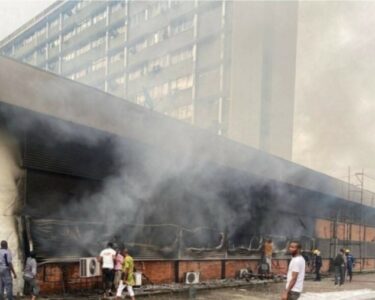Mokwa flood
Over 200 killed, thousands displaced, and vital infrastructure destroyed in Niger State
Summary
- Death toll from the Mokwa flood exceeds 200, with more than 500 still missing
- Over 3,000 people displaced and 265 homes completely destroyed in Niger State
- Key infrastructure, including the Mokwa Bridge and major roads, washed away, crippling trade
- Officials and survivors blame torrential rain, possible dam overflow, and poor drainage
Mokwa, Niger State — A catastrophic flood that swept through Mokwa, a major market town in north-central Nigeria, has left more than 200 people dead, hundreds missing, and thousands homeless in what is being described as the most severe flood in the area in over six decades.
The disaster began with a powerful overnight downpour late on Wednesday, May 28, 2025, and intensified into Thursday morning. Torrents of water overwhelmed homes, swept away families, collapsed bridges, and submerged entire neighborhoods, devastating the communities of Hausawa, Tiffin Maza, and Anguwan Hausawa.
On Friday 30th May, 2025, Head of National Emergency Management Agency (NEMA) Minna Operation Office, Mr Hussaini Isa, Director General NEMA, Mrs Zubaida Umar, Director Planning Research and Forecasting, NEMA, Dr Onimode Abdullahi Bandele, Sarkin Hausawa Mokwa, Alhaji Tanko Bala, paid an assessment visit to Mokwa where they interacted with some of the persons impacted by the flood disaster that devastated Kpege area of the town.
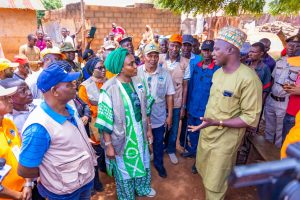 Director General of National Emergency Management Agency (NEMA), Mrs Zubaida Umar, NEMA Head, Minna Operation Office, Mr Hussaini Isa, Director Planning Research and Forecasting, NEMA, Dr Onimode Abdullahi Bandele, Sarkin Hausawa Mokwa, Alhaji Tanko Bala on the assessment visit to Mokwa
Director General of National Emergency Management Agency (NEMA), Mrs Zubaida Umar, NEMA Head, Minna Operation Office, Mr Hussaini Isa, Director Planning Research and Forecasting, NEMA, Dr Onimode Abdullahi Bandele, Sarkin Hausawa Mokwa, Alhaji Tanko Bala on the assessment visit to Mokwa
By Sunday, June 1, the official death toll had climbed to at least 200, with bodies found up to 10 kilometers from the town, many believed to have been swept into the River Niger. The Niger State Emergency Management Agency (NSEMA) reported 151 confirmed deaths as of May 31, while international media placed the figure even higher.
Over 500 people remain missing, with local officials fearing no additional survivors may be found. Rescue operations have transitioned to recovery, and all known victims have been buried to prevent the spread of disease. At least 11 people are being treated for injuries in nearby hospitals.
More than 3,000 people—across 503 households—have been displaced, and over 265 homes have been confirmed destroyed. Entire families have been torn apart. One survivor, a 36-year-old father, recounted to the BBC how his wife and newborn child, who had just returned home the previous day, were swept away in the chaos.
The flood has ravaged Mokwa’s infrastructure, severing critical transport links between northern and southern Nigeria. Two major roads and three bridges, including the vital Mokwa Bridge, have been destroyed, leaving thousands of motorists and traders stranded.
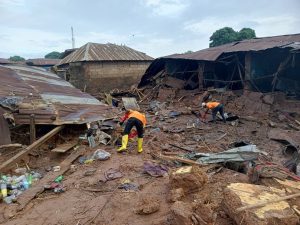 NEMA officials searching for survivors
NEMA officials searching for survivors
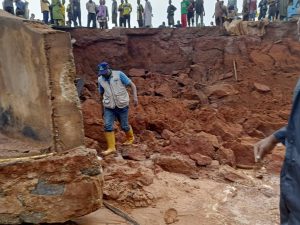 Emergency responders at one of the collapsed bridges
Emergency responders at one of the collapsed bridges
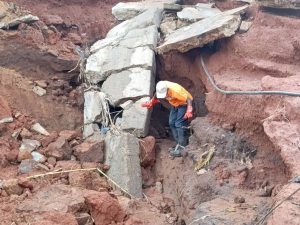 Another section of one of the collapsed bridges
Another section of one of the collapsed bridges
With farmland washed away and market activity suspended, there are growing fears of an impending food crisis. Mokwa serves as a key hub where northern farmers transport produce like beans and onions to the southern states. The flood’s impact is expected to ripple through the national economy in the coming weeks.
Although torrential rainfall is the primary cause, some residents believe a dam or reservoir upstream may have failed, intensifying the flood. The district head of Mokwa, Muhammadu Shaba Aliyu, acknowledged that local reservoirs can overflow during heavy rain but called the flood “unprecedented.”
Local authorities also cited inadequate drainage systems and the lack of preemptive flood-control measures as critical factors. Jibril Muregi, chairman of the Mokwa Local Government Area, lamented long-standing infrastructure neglect.
President Bola Tinubu expressed “profound sorrow” and ordered the activation of the national emergency response center. He pledged a swift, coordinated relief operation to prioritize recovery and promised that no victim would be left behind.
On May 30, Niger State Deputy Governor Yakubu Garba visited the scene, where he assessed damage and ongoing relief efforts. NSEMA, under the leadership of Abullahi Baba-Arah, is working alongside the Nigerian Red Cross to provide emergency shelters and distribute food and medical aid.
Rescue teams toiled through the weekend to search for survivors and recover bodies. By Sunday, however, officials declared an end to active rescue, transitioning to the grim task of body exhumation to prevent disease outbreaks. Community leader Musa Kimboku emphasized the need for rapid sanitary interventions.
In a notable act of generosity, Senator Sani Musa (APC, Niger East) donated ₦50 million and several truckloads of food supplies to displaced families. The Nigeria Governors’ Forum, led by Kwara State Governor Abdulraman AbdulRazaq, also expressed solidarity and encouraged citizen donations.
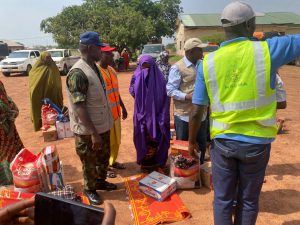 NEMA officials distributing relief items to affected persons in Mokwa
NEMA officials distributing relief items to affected persons in Mokwa
Experts say the disaster underscores a disturbing trend. Floods have become deadlier and more frequent across Nigeria, with 321 deaths recorded in 2024 and over 600 in 2022. The Nigerian Meteorological Agency had issued warnings about heavy rainfall in Niger and other states between May 28 and May 30.
Climate change, combined with poor urban planning and weak enforcement of building regulations, continues to heighten flood risks. Warmer temperatures increase atmospheric moisture, making heavy rain more intense during the brief April-to-October wet season.
Personal stories emerging from Mokwa are harrowing. From a father mourning his family to a market vendor swept away at dawn, the human cost is incalculable. One resident, Usman, told the News Agency of Nigeria that he saw homes crumble “like paper” and people vanish in minutes.
Local leaders, including district head Aliyu and elder Aliki Musa, are pleading for long-term investment in flood-control infrastructure and sustainable resettlement plans.
With hundreds still missing and thousands without homes, Mokwa’s recovery will require sustained government commitment, donor support, and urgent climate resilience planning. As Musa Kimboku put it: “We cannot wait for the next flood to act.”






